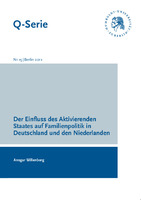Der Einfluss des Aktivierenden Staates auf Familienpolitik in Deutschland und den Niederlanden
Abstract
This dissertation investigates the influence of the political-administrative ideal of the ‘activating state’ on German and Dutch family policy. It is studied to what extent parallels can be discerned between the family policies that are pursued by these two countries. It is clarified how the aforementioned ideal is converted into family policy, whilst also offering an answer to the question whether any convergences exist in the field of family policy as pursued within the European Union. In order to be able to answer this question, an ideal model for activating family policy has been created to facilitate a comparison between the two countries. This involves an inductive method in which the divergences and convergences of both countries have been worked out in greater detail. In view of the development of the ideal model, Bandemer’s indicators for the ‘activating state’ are studied in combination with Kaufmann’s family policy goals and instruments, and Esping-Andersen’s state intervention typologies for family policy. This is followed by a specification of the family policy goals and instruments based on an analysis of various documents. The goal of this investigation is to concretise the concept of activating family policy. Additionally, it is shown which ‘activating strategies’ have been used by both countries and how they have translated the ideal of an activating state. Not only does this offer an answer to the theoretical question about the use of activating policies in areas other than the often-evaluated labour market policies, but it also provides an overview of various activating examples. Using an analysis of the investigated instruments and the corresponding literature, a number of conclusions have been formulated about the convergences and divergences in the family policies that are pursued by these two countries. The dissertation ends with an assessment of the ideal’s gaps and shortcomings and a discussion about its possible further development. Diese Arbeit betrachtet die Umsetzung des politisch-administrativen Leitbildes Aktivierender Staat in der Familienpolitik Deutschlands und der Niederlande. Es wird untersucht, ob es zu Parallelen in den Familienpolitiken kam. Hierdurch kann erstens die Frage nach der Umsetzung des Leitbildes in der Familienpolitik und zweitens die Frage nach familienpolitischen Konvergenzen innerhalb der Europäischen Union beantwortet werden. Um die Fragestellung zu bearbeiten wird zum Vergleich der beiden Länder ein Idealmodell Aktivierender Familienpolitik entwickelt. Es handelt sich hierbei um eine induktive Herangehensweise, bei welcher die Divergenzen und Konvergenzen der beiden Länder herausgearbeitet werden. Zur Entwicklung des Idealmodells werden Bandemers Indikatoren zur Beschreibung des Aktivierender Staat, die familienpolitischen Zielsetzungen und Instrumente von Kaufmann und die familienpolitischen Staatsinterventionstypologien von Esping-Andersen herangezogen. Die Beschreibung der familienpolitischen Ziele und Instrumente erfolgt anhand einer Dokumentenanalyse. Durch diese Arbeit wird der Begriff Aktivierende Familienpolitik konkretisiert. Außerdem wird sichtbar, welche Aktivierungsstrategien die beiden Länder verfolgten, bzw. wie sie das Leitbild des Aktivierenden Staates umsetzten. Hierdurch kommt es nicht nur zur Bewertung der theoretischen Frage nach der Anwendung aktivierender Politiken in anderen Bereichen als der bereits häufig evaluierten Arbeitsmarktpolitik, sondern auch zu einer Übersicht verschiedener Aktivierungsbeispiele. Anhand einer Analyse der untersuchten Maßnahme und hinzugezogener Literatur werden Schlüsse gezogen im Hinblick auf familienpolitische Konvergenzen und Divergenzen zwischen den beiden Ländern. Die Bewertung der Lücken und Defizite des Leitbildes und die Diskussion über die mögliche Weiterentwicklung des Leitbildes runden die Arbeit ab.
Keywords
governmental reforms; family policy; activating state; internationaler vergleich; verwaltungsreformen; familienpolitik; international comparism; aktivierender staat; Arbeitsmarkt; Bundesregierung (Deutschland); Deutschland; Gøsta Esping-Andersen; Kinderbetreuung; Koalitionsvertrag; Niederlande; RegierungserklärungDOI
10.26530/OAPEN_382630ISBN
9783860042663OCN
808385252Publisher
Humboldt-Universität zu BerlinPublication date and place
2011Series
Q-Serie, 15Classification
Society and Social Sciences
Society and culture: general
Sociology and anthropology
Anthropology
Political structure and processes


 Download
Download Web Shop
Web Shop